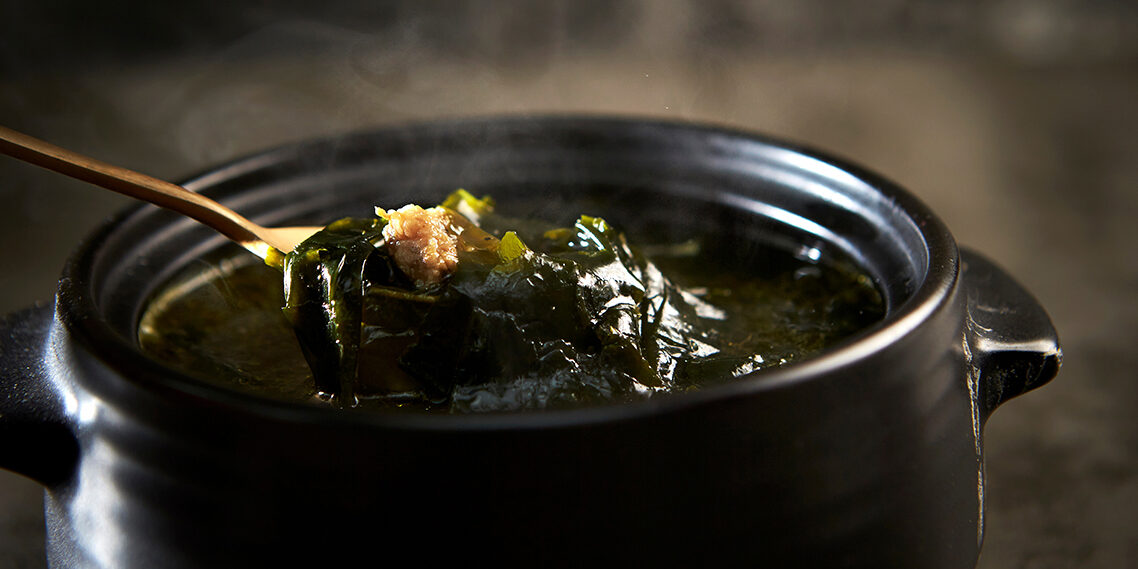“It wasn’t until that day that I truly enjoyed the depth of flavors in miyeok-guk. But it took me even longer to understand the unspoken message behind my mom’s relentless demands that I eat it each birthday anniversary.“
“Ew. What is that?” Growing up, there was one dish that I wished my mom wouldn’t make when I had non-Korean friends over. Without fail, it would generate dubious looks, crinkled noses, and polite declines of my mom’s invitations to stay for dinner.
Miyeok-guk. Or, literally, “seaweed soup.” Like so many children of Korean immigrant parents, I grew up celebrating my birthday not with colorful frosted cake but with what looked like — to my childish eyes — a steaming heap of slimy, unkempt gunk sitting in suspiciously green water. I’d pick at the soup unenthusiastically while listening to my mom’s recitations of its supernatural healing powers. “Moem eh jowah, it’s good for your body! Maneeh muguh, eat a lot!” she’d insist, while spooning another ladle full of soup into my half eaten bowl.
When I first left home for college, I yearned for all the Korean dishes of my youth — galbi, kimbap, soondubu, bokkeumbap… everything except miyeok-guk. I spent a decade in my 20s never seeking it out or craving it, notwithstanding my mom’s persistent calls every birthday to remind me to eat miyeok-guk.
But when I entered my 30s, it reappeared in my life. After I gave birth to my first child, my mom showed up at my front door with grocery bags full of dried myulchi and miyeok, insisting that she cook me two weeks’ worth of miyeok-guk. “Moem eh jowah!” she urged, while preaching to me the familiar powers of miyeok-guk. I had no appetite for seaweed soup and attempted to protest. But I eventually relented to appease her — as any Korean knows, trying to decline food from a Korean mother is like trying keep the ocean waves from washing ashore.
As my mom bustled around the kitchen, I realized that in all the years I spent under her roof I had never actually watched her make miyeok-guk. That day, I finally did. I watched her patiently soak the myulchi in warm water until the air was faintly reminiscent of a sea breeze, and then gently strain the water into a clear soup base. I watched her carefully untangle the dried miyeok, still encrusted in white flakes of evaporated saltwater, and bring it to a lazy simmer in the myulchi base along with slices of lightly seared beef. And I watched as she finished the soup with a dash of sesame oil, ground perilla seeds, and a pinch of salt. She moved fluidly and quickly, like someone acting on muscle memory from having made the soup hundreds of times before.
When she placed the miyeok-guk in front of me, I was surprised to find that it neither resembled nor tasted anything like the vestiges of my childhood memories. The miyeok swirled freely with hearty chunks of meat in a brimming bowl of beautifully translucent broth hinting of a grassy green. The miyeok was cooked to textural perfection, tender yet with a slight pleasant crunch. And with each bite, I tasted all at once the brininess of the ocean, a beefy richness, and a subtle nutty essence.
It wasn’t until that day that I truly enjoyed the depth of flavors in miyeok-guk. But it took me even longer to understand the unspoken message behind my mom’s relentless demands that I eat it each birthday anniversary. It was only after a harrowing experience of prematurely delivering and losing my second baby, that I understood.
In the weeks that followed my daughter’s birth and death, I felt nothing but the aching, white hot stone of a mother’s grief sit stubbornly at the pit of my stomach. It was in those moments that I discovered the fierceness and the eternal burn of a mother’s love. With that, I realized that my mom’s incessant supplications to eat miyeok-guk were really a mother’s desperate plea to the world to bestow health on her own child. And so when she made me miyeok-guk once again in those postpartum days, that time, I quietly and gratefully accepted.
Now I fully appreciate the reason why we Koreans eat miyeok-guk on our birthdays. We eat it to honor our mothers who labored to bring us safely into this sacred life. But for our mothers, making miyeok-guk on our birthdays is also their way of saying a silent prayer that we, as their forever children, will enjoy another year of good health.





